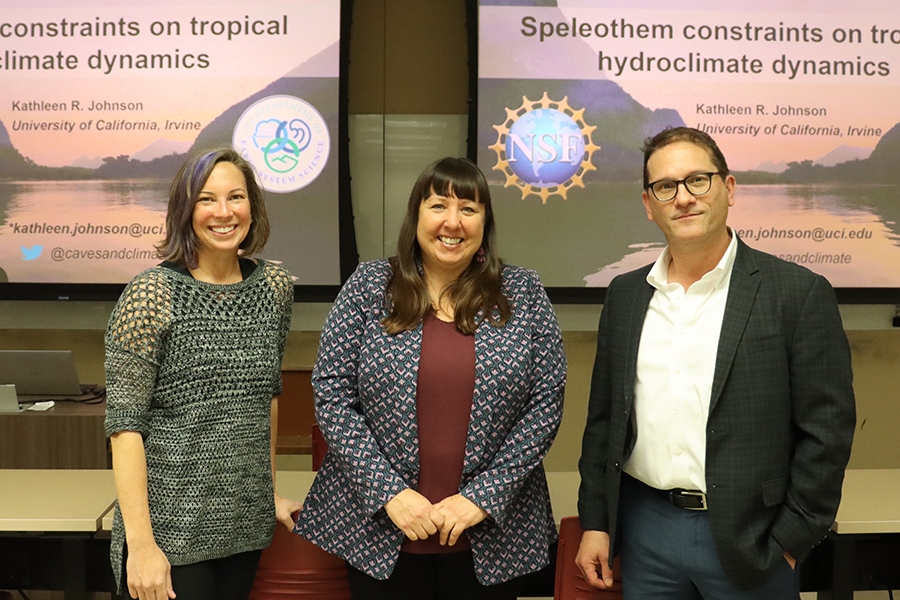Kathleen Johnson, Ph.D., an associate professor in the Department of Earth System Science at the University of California, Irvine, and member of the Anishinaabe; Grand Traverse Band of Ottawa and Chippewa Indians, gave two presentations, “Speleothem Constraints on Tropical Hydroclimate Dynamics” and “Toward Climate and Environmental Justice in Indigenous Communities: The Role of STEM Research, Community Engagement, and Education,” to nearly 100 students, faculty and staff during her visit to the University of Oklahoma last month.
The lectures were co-hosted by the Institute for Resilient Environmental and Energy Systems, the OU College of Atmospheric and Geographic Sciences, and the Mewbourne College of Earth and Energy.
“A lot of my work is focused on studying tropical and monsoon climates, because the Asian monsoon system and tropical rainfall patterns are expected to undergo huge changes in response to climate change,” Johnson said. “The other area we’re working in is Mexico, which is projected to become drier.”
As a geochemist and paleoclimatologist who specializes in reconstructing past climate change using natural archives from speleothem – stalagmites and stalactites – in caves, Johnson’s work is founded on the belief that climate change will increase the intensity of rainfall, flood, and drought extremes.
“Speleothems form as a result of rainfall filtering through limestone bedrock and depositing into a cave. Within those calcite growth layers are a number of geochemical signals that we can use to study the past,” Johnson said. “Most importantly speleothems are well-suited for uranium-thorium dating because they form with appreciable uranium that is fairly soluble in natural waters but will contain very little thorium daughter product. Since that sets the radioactive isotope clock to zero, we can date these samples with very high precision up to 500,000 years old.”
Johnson is also the principal investigator for the UC Irvine Climate Justice Initiative and spoke about the impact of climate on Indigenous communities.
“We know that climate change is disproportionately impacting marginalized communities, and that Indigenous people are at the forefront of the climate crisis,” Johnson said. “Climate impacts throughout this history have been strongly shaped by settler-colonialism, violence and forced displacement, harm from the fossil fuel industry and mining industries happening on Indigenous lands, and exploitive research practices by scientists.”
Only about 22% of Indigenous people live on Tribal lands in the United States, with large populations in urban areas throughout the country. According to Johnson, Native populations often live in economically marginalized regions and are often subject to environmental injustices faced by other populations of color.
“If you talk to Native people, they will say that environmental justice is not possible without returning land,” Johnson said. “This is known as the ‘Land Back’ movement and has grown in popularity in recent years.”
Johnson also spoke about the concepts of decolonizing science, original land acknowledgements and respect for Indigenous knowledge using the guiding framework of the ‘Four Rs,’ which are reciprocity, relevance, responsibility, and respect.
“If you really want to decolonize science, the paper by Tuck and Yang, ‘Decolonizing is not a metaphor,’ is a good place to start. Sadly, there has been a lack of respect for Indigenous knowledge in academia, but I think there is potential for change being led by students and early-career faculty.”
Learn more about Johnson’s research efforts or read about the Institute for Resilient Environmental and Energy System’s research areas.


